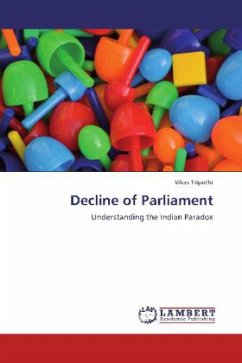This book presents a strong case for the decline of Indian Parliament in ensuring an accountable, responsible and responsive government during 1990s and beyond. The assessment herein, deals not only with parliament as an institution performing various mandated functions, but also looks into the aspect of general public perception about the institution of political governance, chiefly the representatives and the political parties. Nevertheless, as one proceeds to revisit the decline of India s Parliament, one is confronted with several paradoxes to the decline of legislature thesis as accredited to India. Thus, this book intends to dwell on the working of Indian Parliament, contextualizing both the external challenges and internal setbacks, offering explanation for the peculiar nature of the decline of India s Parliament. The nature of the decline of India s parliament has been dealt here as a paradox against the generally held thesis of the decline of legislature.







